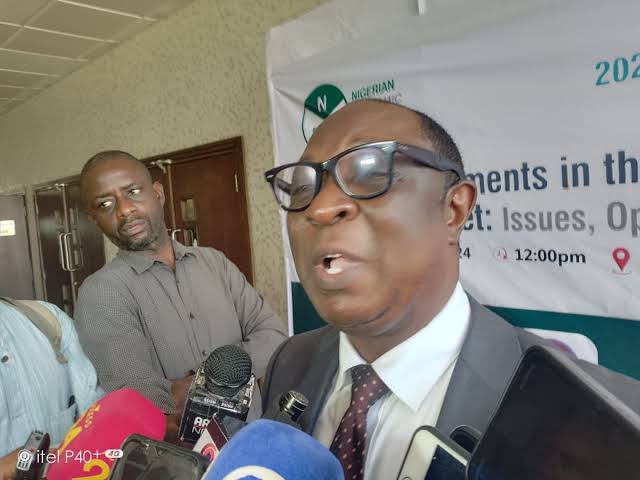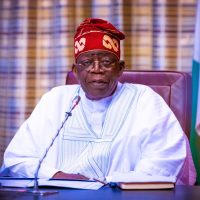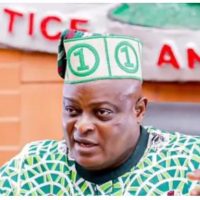By Ismael Taiwo
Economic experts across all walks of life attended the Public Lecture recently organized by the Nigerian Economic Society NES on Thursday 22nd of February, 2024 which was held at the CBN Centre of Excellence Hall, Faculty of Economics, University of Ibadan.
The theme of the event titled: “Recent Development In The Nigerian Foreign Exchange Market: Issues, Options and Way Forward” was delivered by a foremost Professor of economics, Professor Sam Olofin.
Prof. Sam Olofin in his words, tasked Federal Government and all other major stakeholders across the country on the urgent need to save naira from imminent collapse.
He further stressed that if the Naira must be saved from imminent collapse, the time has come to rescue it from the hands of the powerful operators in the foreign exchange market and that it would be unreasonable at this crucial time to be allowing market forces alone to determine forex prices. He averred that Central Bank is created to be visible and not be invisible and as such, the time is now to strictly act as a regulator to save Naira from total collapse.

Quoting from the Don’s words, “the time has come like it is in other countries that believe in rule of law, to define what is legal and distinguish such from what is criminal.
“Have criminals apprehended and made them to face severe consequences for their actions.The weak and vulnerable need to be protected and prevented from severe hunger.”
“We have examined the evolution and operations of the Nigerian Foreign exchange market in relation to recent policy measure aimed at addressing observed anomalies in the market. As we speak the Naira value against major foreign currencies especially the dollar has continued its free fall and stands at over N1,500 to a dollar.”
“Without sounding too simplistic or offering a silver bullet that would solve the seemingly complex problems in the foreign exchange market, our attention should be focused on this powerful segment of the market, the so-called parallel or black market. We have succeeded either deliberately or unwittingly, in creating a monster that has been well protected.”

The depreciation of the Naira continues on daily basis and it appears that if appropriate steps are not taken, the Naira may be heading towards crash as the value races towards the 2,000 Naira to a dollar mark and possibly beyond, and the unimaginable consequences this would have on the rate of inflation and the entire economy.”
“The immediate issue of concern in the near and immediate future as to the way forward should be on how to put a halt to this free fall, stabilize the value of the Naira and ensure effective operation of the foreign exchange market.”
“The new policy measure put in place in June 2023, still regards as its center piece the “willing buyer and willing seller” model, in effect assuming a perfect competitive market in which forces of supply and demand would ensure the quality assurance is high emergence of market clearing exchange rate. Also that this would stabilize tue market.”
“Far from it, the Nigerian Foreign exchange market is never a perfectly competitive market, and no matter how we try this market structure and all its assumptions, which may be relevant in other economies particularly developed economies cannot be super-imposed on Nigerian Foreign exchange market.”
“In addition to other things that we value the Naira for like most other currencies it remains one of the important symbols of our sovereignty as an independent country as we pursue our dreams and aspirations as a country immensely blessed by God and with great potentials.” Olofin said.
Dr. Usman Opanachi, Department of Monetary Policy, CBN who represented the Central Bank Governor Dr. Olayemi Cardoso, urged Nigerians to be patient as their policies will yield result soon. He was quoted saying, “anytime Naira is on trial, the CBN is also on trial. We are working day and night to address the challenges and we hope things will work out. The exchange rate features nearly in every sector. The exchange rate and inflation are very high now. The exchange rate is a problem on its own.
“Excess demand for forex in Nigeria is a legendary problem. It has just been there and over the years, the bank has implemented various strategies to address this problem. Those strategies have only been able to provide some temporary relief.
“The Central Bank of Nigeria does not supply or produce dollars; It is naira that it produces. CBN management thinks when you hold the price of a commodity that is determined by Fx down artificially, a time comes when you will not be able to do that.
“The thinking of the new management of CBN is that the policies you have are intended to address the problem. The approach the management has adopted is the Market forces approach. The bank now allows the market forces to play a greater role in the determination of the price of naira.”
In his own speech, the Special Adviser on Economic Matters to President Tinubu, Dr. Tope Fasua affirmed that, concerted efforts have been made to ensure that Naira is rescued from total collapse. He therefore urged the citizens to exercise patience as the policies currently embarked on by the government will eventually yield results in the long run.
He also corroborated the stance of Prof. Sam Olofin that Nigerian Government cannot afford to leave the determination of forex market prices in the hands parallel market operators. Hence, the need to embark on managed floating and reeling out of interventionist policies to curb the excesses of some of these speculators.
Earlier in his welcome address, the President of the Nigerian Economic Society, Prof Adeola Adenikinju said “the choice of today’s theme is apt as it is perhaps the most important issue in Nigeria today. From Aso Rock to the CBN headquarter, and NNPC Towers, from Marina street in Lagos to Bodija Market in Ibadan, the fish seller in Yenagoa to suya seller in Sokoto to the farmer in Markurdi, the exchange rate is on the lips of everyone. Hence, the choice of the topic for the 2024 NES Public Lecture.”
“The subject of foreign exchange is within the ambit of economics. The exchange rate is a price. However, for an import dependent economy like ours, it is a price that influences other prices in the economy – products, money, and factor markets. The spike in inflation in the last few months in particular has been largely driven by the exchange rate. The pass through effect from the exchange rate to other prices is quite high.”
“The government, especially the CBN, has reacted to the sharp and persistent devaluation of the naira with a rash of circular and policies. At times, we worry that the effects of a particular policy have not been assessed before others are quickly thrown into the mix. This action has a tendency to add to uncertainty and the flight to safety postures of economic agents, who continue to hold dollars outside the banking system,” he said.



